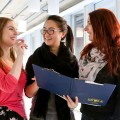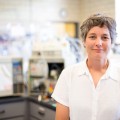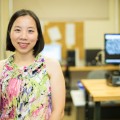 The University of Toronto (U of T) is working hard to attract more females to science and engineering careers, not only with the highest female first-year student enrollment in Ontario, as noted in a previous article, but also with its faculty.
The University of Toronto (U of T) is working hard to attract more females to science and engineering careers, not only with the highest female first-year student enrollment in Ontario, as noted in a previous article, but also with its faculty.
The number of female faculty members at U of T has more than doubled over the past eight years, reaching 44 in 2014, up from just 21 in 2006. In total, 17% of faculty members are women – three points higher than the Ontario average, and four points higher than the average for all of Canada.When it comes specifically to the engineering department, 27.8% of associate professors are now women, compared to the Ontario average of just 15% and the national average of 15.7%

Elizabeth Edwards (ChemE)
Female Faculty Rising Up the Ranks
Currently, all three of the Faculty’s 2014 Canada Research Chairs are women: Aimy Bazylak (MIE), Elizabeth Edwards (ChemE) and Goldie Nejat (MIE). And of the four most recent professors to be added to the U of T STEM team, three were women, including: Elodie Passeport (ChemE, CivE), Margaret Hai-Ling Cheng (IBBME, ECE), and Gisele Azimi (ChemE, MSE).

Aimy Bazylak (MIE)
Passeport received her PhD in Water Sciences in France followed by her postdoctoral fellowship at UC Berkeley. Hai-Ling Cheng, who went to U of T herself, has conducted research at the Hospital for Sick Children, using her expertise in electrical and computer engineering combined with biomedical training to develop magnetic resonance imaging technologies.

Goldie Nejat (MIE)
Also a U of T alumnae, Azimi received her PhD in chemical engineering there, followed by two postdoctoral positions at MIT – in material sciences and mechanical engineering.
“The obligation we have as educators – to inspire students and open their eyes and minds to endless possibilities – is an opportunity and responsibility I truly look forward to, says Hai-Ling Cheng.

Elodie Passeport (ChemE, CivE)
No Signs of Slowing Down
U of T plans to continue its efforts to welcome female educators, particularly in the sciences, and notes that female faculty numbers will continue to grow as early-career faculty move up the ranks and leave openings for new educators.

Gisele Azimi (ChemE, MSE)
“This achievement is encouraging,” says Dean Cristina Amon, “as we continue ourproactive efforts to foster diversity within the Faculty, among universities and across the engineering profession.”

Margaret Hai-Ling Cheng (IBBME, ECE)
“Engineering has changed significantly from when I began at U of T several decades ago,” adds Professor Susan McCahan, vice-provost, innovations in undergraduate education, and the University’s first female faculty member in mechanical engineering. “It is increasingly recognized as a vibrant and innovative profession: one that encourages broad perspectives and collaboration to drive positive changes that improve our world.”
Related Article:
University of Toronto Outranks National Average for Women in Engineering



